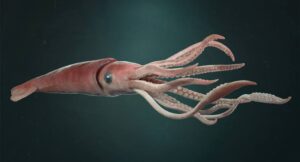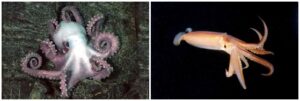Wondering what does a squid look like? How squid is different from octopus? If so, then you’re in the right place to know that. Often, squids and octopuses are baffled with each other, and do you know the reason behind that? Both belong to the same class- cephalopod. That’s why it’s natural to get confused. But, there are some differences regarding the size, and much more. There are around 300 species of both of them in the global ocean. So, what makes them different from each other? This post is all about helping you unearth all the differences.
Before we get to Octopus Vs Squid, let’s first know what does a squid look like.

Similar to other cephalopods, squids entail arms, a mantle, distinct head, and bilateral symmetry. Like cuttlefish, they entail 8 arms and 2 tentacles that are positioned in pairs. Some squid species entail 10 arms, as well.
Octopus Vs Squid – Key Differences
Both fit into the cephalopod class and what it signifies is “head-footed” since they entail no actual feet. And head for both of them is the high-flying feature. They’re mollusks as well as invertebrates. In contrast to mollusks, none of them entail a shell.
However, though they can look like the same, their physical distinctions and unique tactics of hunts differ. We will explain their differences and resemblances in terms of several aspects to understand both of them better.
So, let’s begin.
1: Anatomical Differences

Octopuses are without an internal skeleton; they’ve soft bodies. There is only one hard part – it is the beak. They use it for prey.
A squid’s central body heap is encrusted in their mantle – that has 2 swimming fins all along every side. And the fins aren’t the chief ambulation supply in most squid species, contrasting to other aquatic organisms. The squid’s skin is encrusted in chromatophores, which aids them to alter the tint to go well with its environment.
Both are known to have 3 hearts. And in both of them, the blood includes a protein called hemocyanin that is rich in copper. All species have organs systems similar, but not identical.
2: Size Difference
Most squid species are no longer than sixty centimeters. However, the giant ones could be 13 m long. Plus, traces of up to twenty-meter (66 ft) specimens have been found.
On the other hand, the octopuses nurture in size – ranging from 1 cm to approximately 5 m. They have quite a short lifespan – might not live longer than four to five years, however, they may grow strong in weight.
3: Locomotion
Both can locomote through “jet propulsion”. They both are known to locomote in all directions. They can swiftly change their course. When they swim at quite low speeds, squids take advantage of fins sited on the heads for propelling themselves. These fins help them steer and soothe when they move gradually, and when they locomote fast, they wrap around their body by means of jet propulsion.
Most octopuses, when they are adults, are without fins. There are comes exceptions that are deepwater octopuses but not all, only some. A squid’s eyes sited on the head are either side, with a hard lens.
4). Hunting
Their hunting methods can differ because of their differences in anatomy. Let’s first talk about squids – they are found to be swim in groups. They employ their 2 additional tentacles through sucker rings in order to provide them a bit additional reach and aid catch prey – which they’ll devour in chunks.
Octopuses, whereas, remain on the seafloor and consume benthic crustaceans. The reason behind this is – soft bodies make octopuses prone to predation. They catch, pierce and instill venom into their quarry for paralyzing it. Through their saliva, they will melt and loosen the meat of the victim before tearing it apart through their mouth or beak.
5). Reproduction
Mating technique is another primary difference here.
Let’s first talk about octopuses – male ones entail a specialized arm known as hectocotylus that they employ it to convey spear to an approachable female’s mantle cavity. After then, the female lays down a cord of fertilized eggs on her den top and she then protects and cleans. Also, she aerates using water debarred from her siphon – from thirty days to one year, it relies on the species. She might construct a rock wall for sealing off her den, and she will then stay there until she passes way or eggs have produced.
Squids, on the other hand, mate in big groups and append their eggshells to the seaweed or seabed. Just like octopods, they die upon reproducing.
6). Habitat
Let’s first talk about squids – they are often found in numerous regions of the open sea. Octopuses, in contrast, like the seafloor echelon no matter whether it’s deep or shallow waters. Indeed, that’s the reason you’ll find them living in junk, which has sunk to the sea floor’s bottom.
7). Lifespan
Both have a relatively decent lifespan, given their age. Squids typically live from nine months to five years. And octopus can last from one to three years.
Last Few Words:
That’s all – What does a squid look like and key differences and resemblances between squids and octopuses in terms of several different aspects.
In short, both of them are sea mollusks that fit into cephalopod class. But they have many differences concerning size, habitat, anatomy, and much more. Squid species are found in groups, whereas octopuses are solitary. And that’s it.
If you have anything else to share, feel free to let us know in the below comment section.